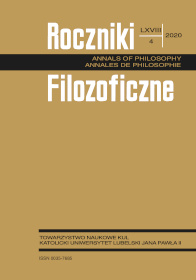The Inference Pattern Mou in Mohist Logic: A Monotonicity Reasoning View
Abstrakt
Schemat wnioskowania mou w logice mohistycznej
Biorąc za punkt wyjścia monotoniczność rozumowania, artykuł przedstawia systematyczny sposób interpretacji schematu wnioskowania mou w tekstach mohistycznych. Wzięliśmy pod uwagę zarówno perspektywę logiczną. jak i lingwistyczną, zwracając szczególną uwagę na specyfikę klasycznego języka chińskiego, rolę kontekstu i uwzględniając wszelkie możliwe wskazówki pochodzące ze źródłowych tekstów. Poprzez zastosowania reguł monotoniczności sformułowaliśmy jednolitą odpowiedź na pytanie, dlaczego shi er ran są uznawane za rozumowania poprawne, a shi er buran przeciwnie — uznawane są za kontrprzykłady.
Bibliografia
van Benthem, Johan. 1986. Essays in Logical Semantics. Springer Netherlands.
van Benthem, Johan. 1991. Language in Action: Categories, Lambdas, and Dynamic Logic. North Holland.
van Benthem, Johan, and Fenrong Liu. 2020. “New Logical Perspectives on Monotonicity.” In Proceeding of the Second Tsinghua Interdisciplinary Workshop on Logic, Language, and Meaning: Monotonicity in Logic and Language. To appear.
Bi, Yuan. 2002. Mozi (Japanese edition). In Mozi Daquan. Vol. 11, edited by Ren Jiyu, 449–896. Beijing: Beijing Library Press.
Chen, Menglin.1983. Mobian Luojixue. Jinan: Qilu Press.
Fraser, Chris. 2012. “Truth in Moism.” Journal of Chinese Philosophy, 39: 351–368. doi: 10.1111/j.1540-6253.2012.01727.x
Graham, A.C. 1978. Later Mohist Logic, Ethics and Science. Hong Kong: The Chinese University Press.
Hutton, Eric L. 2014. Xunzi: The Complete Text. Princeton: Princeton University Press.
Liu, Fenrong, and Jialong Zhang. 2010. “New Perspectives on Moist Logic.” Journal of Chinese Philosophy 37 (4): 605–621.
Lucas, Thoerry. 2010. “The Logic of Mohist Reasonings; Leis and Structured Sorts.” Monthly Review of Philosophy and Culture 37 (8): 65–93.
Moss, Lawrence S. 2010. “Natural Logic and Semantics.” In Logic, Language and Meaning. Lecture Notes in Computer Science. Vol. 6042, edited by Maria Aloni, Harald Bastiaanse, Tikitu de Jager, and Katrin Schulz, 84–93. Berlin, Heidelberg: Springer.
Sun, Zhongyuan. 1987. The History of Chinese Logic (Pre-Qin Volume). Beijing: China Renmin University Press.
Sun, Yirang. 2001. Mozi Jiangu. Beijing: Zhonghua Book Company.
Sun, Zhiqiang. 2020 (to appear). “A Survey on the Logical Study of Mou.” In Handbook of the History of Logical Thought in China, edited by Fenrong Liu, Jeremy M. Seligman, and Jincheng Zhai. Berlin, Heidelberg: Springer.
Suppes, Patrick. 1979. “Logical Inference in English: A Preliminary Analysis.” Studia Logica 38 (4): 375–391.
Wang, Xianqian. 2013. Xunzi Jijie. Beijing: Zhonghua Book Company.
Westerståhl, Dag, and Stanley Peter. 2006. Quantifiers in language and logic. Oxford University Press.
Westerståhl, Dag. 2012. “Classical vs. Modern Squares of Proposition, and Beyond.” In The Square of Opposition: A General Framework for Cognition, edited by Jean-Yves Beziau and Gillman Payette, 195–229. Frankfurt am Main, Bern, Bruxelles, New York, Oxford, Warszawa, Wien: Peter Lang.
Wu, Yujiang. 2006. Mozi Jiaozhu. Beijing: Zhonghua Book Company.
Xu, Yuangao. 2002. Guoyu Jijie. Beijing: Zhonghua Book Company.
Yu, Jin. 1984. “The Inference of ‘Mou’ in the Mohist Canons.” Journal of Teaching and Learning, (04): 83–87.
Yu, Jin. 1986. “On the Inference of ‘Mou’.” Journal of Nanjing Normal University (Social Science Edition), (02): 50–55.
Yu, Yue. 2010. Mozi Pingyi. (Chunzaitang quanshu book series, vol. 2). Nanjing: Phoenix Books.
Zhang, Jialong. 1998. “On the Validity of ‘Mou’ in the Mohist Canons.” In Selected Papers from Workshops on Chinese Mingbianxue and Methodology, on Taoism and the West, and on Feng Youlan's Philosophy, edited by Junquan Chen, 40–44. Beijing, Philosophical Research.
Copyright (c) 2020 Roczniki Filozoficzne

Utwór dostępny jest na licencji Creative Commons Uznanie autorstwa – Użycie niekomercyjne – Bez utworów zależnych 4.0 Międzynarodowe.





